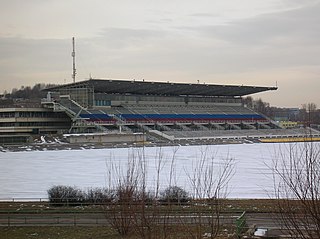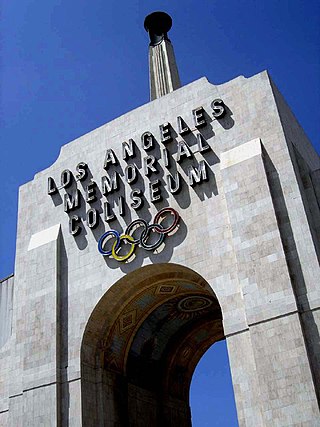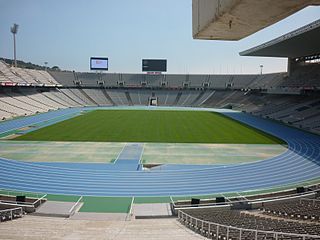
For the 2000 Summer Olympics, a total of thirty sports venues were used. After Melbourne hosted the 1956 Summer Olympics, Australia made several bids for the Summer Olympics before finally winning the 2000 Summer Olympics by two votes over Beijing, China. Venue construction was set at the Homebush Bay area of Sydney in an effort to rehabilitate the land. Environmental studies of the area in the early 1990s forced remediation to be used for about a fifth of the site selected. Fifteen new venues were constructed for the Games. Many of the venues used for the 2000 Games continue to be in use as of 2020, although some of the pre-existing facilities have been demolished and replaced.
For the 1960 Summer Olympics, a total of thirty-four sports venues were used. The Basilica of Maxentius, the Baths of Caracalla, the Appian Way, and Via Cassia were among the ancient Roman venues used for the games. The football stadium in Florence hosted the 1934 FIFA World Cup and would later host the 1990 FIFA World Cup. Stadio Olimpico would later serve host to the 1987 IAAF World Championships in Athletics and the final venue for the 1990 FIFA World Cup. The marathon would be lit at night by Italian soldiers holding torches that included the Appian Way with a finish at the Arch of Constantine.
For the 1964 Summer Olympics, a total of thirty-three sports venues were used. Six of the venues were built before the International Olympic Committee awarded the 1964 Games to Tokyo in 1959. This included two venues that hosted the 1958 Asian Games. There were thirteen new, eight temporary, and five reconstructed and/or renovated venues that were used during the event. During the Olympics, wind and weather had issues with two athletic events. After the Olympics, one venue hosted both a FIFA World Cup and a World Athletics Championship event while another also hosted a World Athletics Championship event.

For the 1972 Summer Olympics, a total of thirty-two sports venues were used. A majority of the venues used were new construction in time for the 1972 Games after Munich was awarded the Games in 1966. Kiel Bay was the only venue from the 1936 Summer Olympics to be used for the 1972 Games. A stretch of the Autobahn near Munich was used for cycling's road team time trial event. After the Olympics, Olympiastadion hosted the final of the FIFA World Cup less than two years later. Augsburg's Eiskanal has served as host to three Canoe Slalom World Championships while the shooting range hosted the World Shooting Championships 2010. Olympiapark was part of Munich's bid for the 2018 Winter Olympics.

For the 1976 Summer Olympics, a total of twenty-seven sports venues were used. Several venues used had been in existence before Montreal made its first Olympic bid in the late 1930s. By the 1950s, Montreal's bid for the Olympics shifted from Winter to Summer before it was finally awarded the 1976 Summer Games in 1970. Strikes in 1974 and 1975 affected construction of the Montreal Olympic Park, most notably the stadium, pool, and velodrome, to the point where the FINA President threatened to not have the diving, swimming, and water polo events take place there for the games in early 1976 though all three venues were completed as best as possible prior to the 1976 Games. 27 swimming world records were set as a result. The oldest stadium, Molson Stadium at McGill University, would be converted into artificial turf for the field hockey tournaments while the sailing program in Kingston, Ontario, would be held in freshwater, both for the first time in Summer Olympic history. Indoor track cycling took place at the Olympics for the first time at the velodrome. Once the Olympics finished, the Montreal Expos and Montreal Alouettes moved into Olympic Stadium, staying until 2004 and 1997, respectively. The Montreal Canadiens remained at the Montreal Forum until they moved to the Molson Centre in March 1996. In 1992, the velodrome was converted into an indoor zoo now known as the Montreal Biodôme. Île-Notre Dame hosted a canoe sprint world championships and two rowing world championships since the 1976 Games, but the area north of the basin on the island has been host to the Formula One Canadian Grand Prix on an almost annual basis since 1978.

For the 1980 Summer Olympics, a total of twenty-eight sports venues were used. The first venue used for the Games was built in 1923. With the creation of the Spartakiad in Moscow in 1928, more venues were constructed. Central Lenin Stadium Grand Arena was built in 1956 for that year's versions of the Spartkiad. A plan in 1971 to construct more sports venues by 1990 was initiated, but accelerated in 1974 when Moscow was awarded the 1980 Games. The new venues to be used for the Games were completed in 1979. During the Games themselves at the permanent road cycling venue, the first ever constructed, the largest margin of victory was recorded in the individual road race cycling event since 1928. The Grand Arena hosted the football final that was played in a rainstorm for the third straight Olympics. After the 1991 break of the Soviet Union, the venues in Kiev, Minsk, and Tallinn would be located in Ukraine, Belarus, and Estonia, respectively. Luzhniki Stadium, formerly Grand Arena, continues to be used, and it was affected by the Luzhniki disaster in 1982. The stadium served as host for the IAAF World Championships in Athletics in 2013. Another venue, the Moscow Canoeing and Rowing Basin, served as host to the ICF Canoe Sprint World Championships in 2014. In December 2010, Russia was awarded the 2018 FIFA World Cup with Luzhniki Stadium and Dynamo Stadium proposed as venues for those events.
For the 1984 Winter Olympics in Sarajevo, Yugoslavia, a total of nine sports venues were used. The idea for the Games came around from a 1968 Organisation for Economic Co-operation and Development study on promoting winter tourism in Yugoslavia. After Sarajevo was awarded the 1984 Games in 1978, venue construction and renovation took place between 1979 and 1983. Weather postponed the men's downhill alpine skiing event three times before it was finally run. The men's cross-country skiing 30 km event was run during a blizzard. After the games, all but one of the venues were damaged during the Bosnian War and the siege of Sarajevo. After the war, Zetra Ice Hall was rebuilt and is in use as of 2010.

For the 1984 Summer Olympics, a total of thirty-one venues were used. The Los Angeles Memorial Coliseum and the Rose Bowl, two venues previously used for the 1932 Summer Olympics, were used for the 1984 Games. Between the 1932 and the 1984 Summer Olympics, the expansion of professional sports teams assisted in the growth of the facilities that would be used for the 1984 events. Only two new permanent venues were constructed, both using corporate sponsorship, though neither were mentioned in the official Olympic report. Many other venues had temporary adjustments and returned to their normal usage once the 1984 Olympics were completed. Stanford Stadium in Palo Alto and the Rose Bowl later served as venues for the Super Bowl, the FIFA World Cup, and the FIFA Women's World Cup.
For the 1988 Summer Olympics, a total of thirty-one sports venues were used. South Korea hosted its first World Championships in 1978 in shooting sports. Three years later, Seoul was awarded the 1988 Summer Olympics. Many of the venues constructed for the 1988 Games were completed two years earlier in time for the Asian Games. The 1986 Asian Games served as test events for the 1988 Summer Olympics. The men's marathon course was lined by 36,000 policemen. Steffi Graf won a gold medal in women's singles to complete the "Golden Slam". None of the football venues used for these games were used for the 2002 FIFA World Cup that Korea co-hosted with Japan.

For the 1992 Summer Olympics in Barcelona, a total of forty-three sports venues were used.
A total of twenty-nine sports venues were used for the 1996 Summer Olympics.







